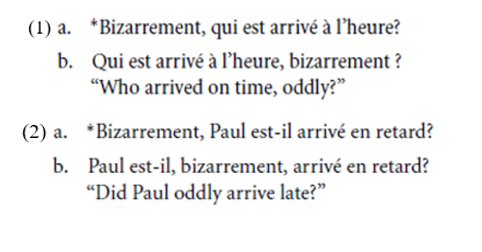


 Grammar
Grammar
 Tenses
Tenses
 Present
Present
 Past
Past
 Future
Future
 Parts Of Speech
Parts Of Speech
 Nouns
Nouns
 Verbs
Verbs
 Adverbs
Adverbs
 Adjectives
Adjectives
 Pronouns
Pronouns
 Pre Position
Pre Position
 Preposition by function
Preposition by function 
 Preposition by construction
Preposition by construction
 Conjunctions
Conjunctions
 Interjections
Interjections
 Grammar Rules
Grammar Rules
 Linguistics
Linguistics
 Semantics
Semantics
 Pragmatics
Pragmatics
 Reading Comprehension
Reading Comprehension
 Teaching Methods
Teaching Methods|
أقرأ أيضاً
التاريخ: 28-2-2022
التاريخ: 2024-01-23
التاريخ: 2025-04-02
التاريخ: 31-7-2021
|
Evaluatives in interrogatives
We noted that although evaluatives are not felicitous sentenceinitially in questions, they are possible if linearized in other positions. This holds not only for wh-questions, but also for polar questions:

This observation poses an interesting interface issue. Note that, leaving aside the problems posed by sentence-internal occurrences of adverbs, the fragment presented above can be extended quite easily to questions. All we need are appropriate definitions for a query utterance type parallel to (2) in the fragment of Grammar and an interrogative-clause type parallel to (1) in the fragment of Grammar. However the ban on initial occurrences is quite surprising. If only wh-questions were affected, one could assume that the head-filler-phrase turns a proposition into a question, and thus that evaluative adverbs are not possible on the left of the wh-phrase because they find no proposition to combine with. But in the case of polar questions no such account is available: since there is no overt marking of the polar interrogative status, we cannot forbid the possibility that the adverb combines with the (proposition-denoting) basic clause before the type-shifting from proposition to question occurs.
Although we presently have no account of the data in (1–2), we note that the phenomenon at hand might shed new light on the status of adverbs occurring in the initial position of questions in general. First, Bonami et al. (2004: 167–170) notes that the class of adverbs occurring sentence-initially in questions is quite odd, and corresponds only loosely to the set of adverbs that occur sentence-initially in assertions. Second, in assertions, it is clear that sentence-initial adverbs may scope lower than some sentence-internal operators, such as tense. As Bonami (2002) emphasizes, the choice of a perfective tense in (3a) can only be justified by the fact that this tense takes the sentenceinitial time-span adverbial in its scope. But initial adverbials in questions exhibit no evidence of a similar behavior: note in particular that time-span adverbials are infelicitous in this position (3b).

This and similar observations suggest that the syntax–semantics interface works quite differently for sentence-initial adverbials in assertions and in questions. A detailed investigation of this issue will have to await future work.
|
|
|
|
حقن الذهب في العين.. تقنية جديدة للحفاظ على البصر ؟!
|
|
|
|
|
|
|
علي بابا تطلق نماذج "Qwen" الجديدة في أحدث اختراق صيني لمجال الذكاء الاصطناعي مفتوح المصدر
|
|
|
|
|
|
|
ضمن برنامج تأهيل المنتسبين الجدد قسم الشؤون الدينية يقدم محاضرات فقهية وعقائدية لنحو 130 منتسبًا
|
|
|